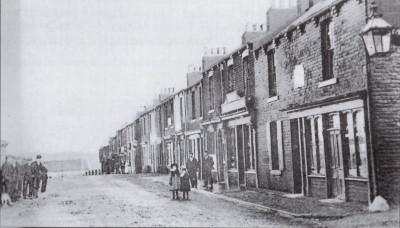Mothers usually shopped at the Co-operative stores. At Trimdon Grange there was a branch of the Coxhoe and District Co-op and a branch of the Station Town and District Co-op was at Trimdon Station. This was a good way of saving and these stores provided everything - groceries, meat, drapery, greengrocery and furni-ture. When a person joined the store he or she was given a personal number which was quoted every time a purchase was made. When the bill was paid the price and number were marked on a small piece of coloured paper. This was duplicated, the shopper keeping one and the store office the other. Every quarter of a year these were reckoned up by the store and by the purchaser and for every pound spent, a dividend was given. This was usually about 10d. or 1/- or 2/- but Sherburn stores sometimes gave as much as 3/-. Unfortunately that was in another village. The shopper could either draw this dividend or let it remain in their store book, thus the store was acting as a bank to their customers. On a Monday, a store girl would visit homes with a book of pages listing all the groceries the customer required. Then she would take payment for the previous week's groceries. The ordered groceries would be delivered by horse and cart on the Friday. The butcher cart and the greengrocer cart also visited the streets so no-one had to carry heavy bags of supplies - everything being delivered to the door quite free. The main orders were for stones of flour and pounds of butter, sugar and tea. These goods would be used for baking and feeding the family for the week.
Clubs could also be taken out for quilts, Christmas extras, clothing etc. One popular club was the Universal. One person would recruit 20 members who would each pay 1/- a week. This meant that the collector would have a pound in the kitty. Members had been drawn out so that the person who had number 1 could have her goods sent for straight away and so forth. Sometimes a person would come round with Christmas Card samples and weekly payments could be made to have private cards. These were cards with the name and address of the sender printed on them. Children took pennies to clubs at sweet shops for their Christ-mas goodies. There were other shops, Pringles, Tulips etc. And each shop provided something extra for their customers at Christmas Time, a box of biscuits perhaps.
Thompson's Red Stamp Stores at the top of the Colliery provided a good way of saving. Every customer was given a book of blank pages and for every 4d. that was spent a 4d stamp was given to be stuck in the book. When a quarter of the book was filled it could be exchanged for goods - teasets, towels etc. A full book meant a very good exchange.
When people were without work the only way they could have any financial help was by going to 'Kind Joe' which was a name given to the Parish run by the board of guardians. No one liked to beg from them and if they did get any money from them it was very little indeed.
If a woman was left a widow, the only way she could support her family was by doing washing and working for the better off. The pay for a full day's washing was half a crown. The food was cheap but labour was cheaper. In 1908 pensioners who were 70 and were finished work were given a pension of 5/- and a married couple were given 7s 6d. This happened under the Asquith government.
Sixpence a week was also collected for the doctor so that he could attend the family when needed. A few pennies were also paid into a Rechabite Club to act as a sort of insurance when a person needed help.

Ellis Street — Gas street lighting.